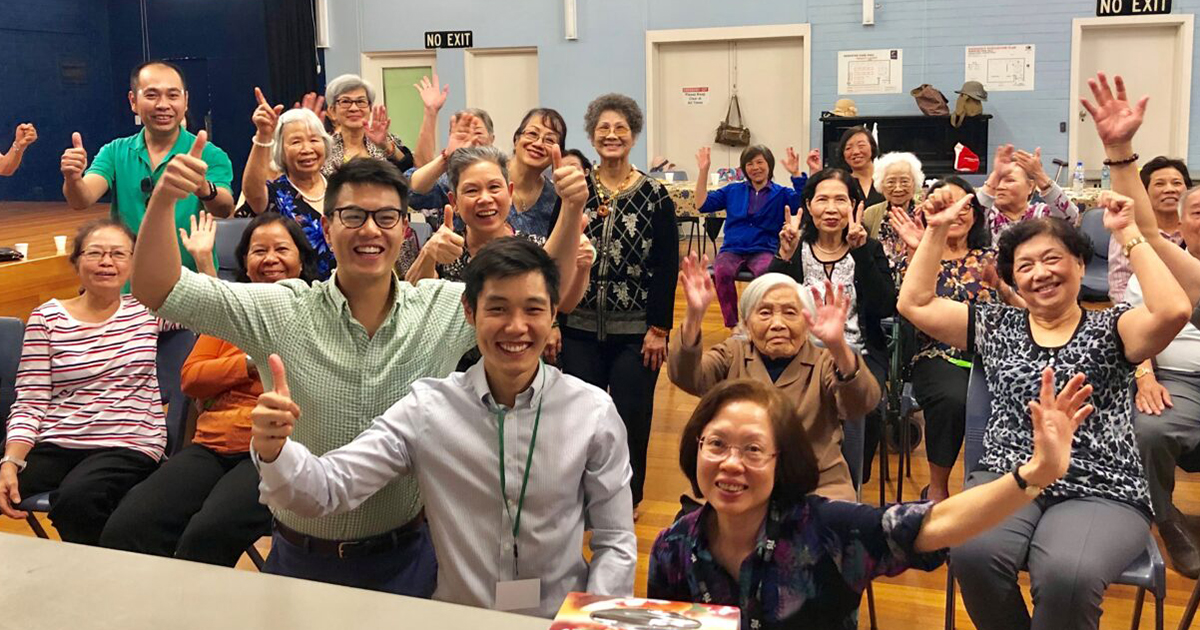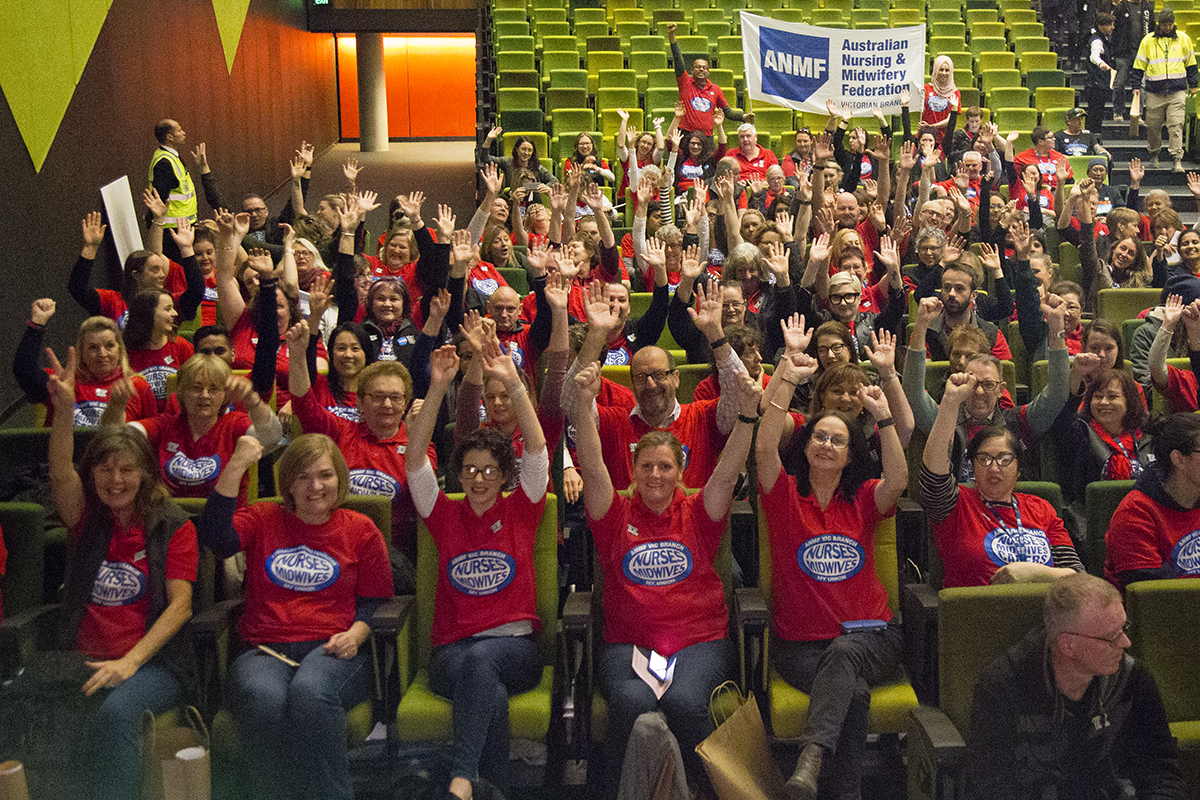
Dr Margaret Beavis of the International Campaign to Abolish Nuclear Weapons (ICAN) shows 2024 delegates conference attendees ICAN's Nobel Peace Prize. Photo: Christopher Hopkins
Dr Margaret Beavis is the co-chair of the Australian arm of the International Campaign to Abolish Nuclear Weapons (ICAN). A former GP, she is the immediate past president of the Medical Association for the Prevention of War (MAPW), which founded ICAN. She spoke at the 2024 Delegates Conference about why Australia needs to sign the UN Treaty on the Prohibition of Nuclear Weapons, and what individuals can do about it.
‘One of the scariest things I saw during the COVID pandemic was Donald Trump, hypoxic and irrational, going into hospital with the nuclear codes, held by a soldier, following him behind.’
Dr Beavis opened her talk by noting that for nuclear deterrence to work, ‘you have to have 100 per cent rational actors and they have to be rational 100 per cent of the time. It’s hopelessly unrealistic,’ she said, ‘and it doesn’t take into account cyber-attacks and terrorists, who with artificial intelligence will have increasingly sophisticated tools to get into these weapons.’
She also pointed out that in the last six decades – since the Cuban Missile Crisis – ‘we’ve come within a whisker of nuclear war more than a dozen times. And really the reason we’re all sitting here today is just dumb luck. Remember: if there’s one thing we learned from COVID it’s that predicted rare events can, and do, happen.’
A nuclear attack on Melbourne?
We all know that nuclear war would be devastating, but to put it into perspective Dr Beavis detailed the effects of a nuclear attack on Melbourne. The initial explosion, she said, would wipe out all electronics. What follows is ‘fire so encompassing it would extend from Point Cook up to Epping and across to Mulgrave. These fires would be of such intensity that all the oxygen is gone from the air. Every living creature dies. The fires released by the bombs are a thousand times stronger than the bombs themselves.’
Anyone who survives would endure global famine caused by a decade or more of nuclear winter – the result of the soot from the fires, now stuck in the stratosphere.
Using less than 3 per cent of current weapons stockpiles, a small nuclear war between, for example, India and Pakistan would have death toll of approximately 100 to 120 million people in the first 12 months. ‘A bigger war, between Russia and America, using half their stockpiles, would probably see more than five billion people globally starving to death by the end of year two.’
What can be done about it?
‘There is quite a strong movement internationally to get countries to return to the [disarmament] negotiating table,’ Dr Beavis said. A key driver of that movement is ICAN: the International Campaign to Abolish Nuclear Weapons.
ICAN ‘started here in Melbourne in 2006’, Dr Beavis told delegates. ‘A group of doctors [the Medical Association for the Prevention of War] got together with a few others and tried to work out what would put pressure on countries to go back to the negotiating table, and to reduce their nuclear stockpiles – eventually down to zero.’
Stigmatising nuclear weapons was where they landed. ‘We needed to make nuclear weapons be perceived like chemical weapons and biological weapons: a source of national shame rather than a source of national pride.’
One of ICAN’s key achievements is the 2017 United Nations Treaty on the Prohibition of Nuclear Weapons. For its ‘ground-breaking efforts to achieve a treaty-based prohibition’ ICAN won that year’s Nobel Peace Prize.
There are currently 93 signatories to the treaty, and 70 countries have taken the extra step to ratify it. Australia has done neither.
The former Coalition government voted against the treaty at the UN General Assembly annually, despite IPSOS polling revealing that almost 80 per cent of Australians want us to sign. And despite federal Labor adopting ‘a resolution in 2018 – moved by Anthony Albanese – committing the party to sign and ratify the treaty in government,’ there has not yet been movement on this front.
‘We are trying really hard to get this government to sign,’ Dr Beavis said. ‘We’ve been pretty disappointed so far, but we’re hoping that possibly early in a second term this will happen.’

Dr Margaret Beavis, co-chair of the Australian arm of the International Campaign to Abolish Nuclear Weapons. Photo: Christopher Hopkins
Where to next?
So what can members do? Dr Beavis noted that as a group, ANMF has been one of ICAN’s ‘strongest partners in Australia’ and she praised the union’s ‘fabulous’ peace position statement.
But as individuals you can start by asking questions of your superannuation fund. ‘Almost all Australian super funds’, she said, ‘finance nuclear weapons, even while they exclude investments in “controversial” chemical and biological weapons. And when we meet with them, they always say: “nobody ever asks us about it, no one ever questions us, so it isn’t a problem”.’
Dr Beavis suggests making it a problem for them. ‘I’m not saying move your super; I’m saying get your super to change.’
She offers three questions you can ask for starters:
- Why do you reject financing tobacco but accept nuclear weapons producing companies?
- Why do you not recognise nuclear weapons as controversial weapons?
- Why do you use “best financial interest” as an excuse when evidence finds that excluding nuclear weapons makes no difference to returns?





